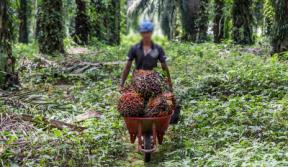As stakeholders gather at the 5th annual Roundtable on Sustainable Palm Oil (RSPO) European Roundtable to begin discussing the review of the certification body’s standards, known as the Principles and Criteria (P&C), NGOs remain critical that improvements to its standard will not be enough to ensure responsible palm oil production without serious reforms to its auditing, enforcement and complaints systems.
Outstanding complaints, including against Indofood Agri Resources, Golden Agri Resources, Sime Darby, IOI Group and Goodhope’s operations, demonstrate that the RSPO’s complaint system is weak, its auditing system flawed and rife with corporate conflicts of interest, and enforcement of noncompliant grower members is lax. The RSPO has not provided the necessary support for communities or workers to engage equitably in its complaint process or protect them from company intervention and reprisal. These systemic failures continue to alienate impacted communities and workers from getting redress so urgently needed and long overdue.
“Communities are frustrated from being dragged on in the complaints process without certainty of the outcome of their efforts. This demonstrates that the RSPO’s complaint mechanism needs to be improved. It needs to brought in line with the UN Guiding Principles on Business and Human Rights, specifically on the effectiveness of their grievance mechanism,” said Andi Muttaqien, Deputy Director of Institute for Policy Research and Advocacy (ELSAM).
Indonesian labor rights advocacy organization OPPUK, Rainforest Action Network (RAN) and International Labor Rights Forum (ILRF) lodged a complaint last year against palm oil giant IndoAgri’s subsidiaries for egregious labour rights violations documented on its plantations in North Sumatra, Indonesia. The complaint calls for suspension of the company and serves as a test case to see how the RSPO fares in upholding labour rights.
“Even with the existing standards, the RSPO has been reluctant to suspend IndoAgri subsidiary PT London Sumatra, which have clearly violated the P&C based on the field evidence we gathered, along with its parent company PT Salim Ivomas. Instead, the RSPO continues to rely on the information gathered by the same auditors who have failed to catch these violations in the first place,” said Herwin Nasution, Executive Director of OPPUK. “Throughout the process, our concerns about workers’ safety and fear of reprisal have not been addressed.”
The RSPO remains a reactive body that only responds to complaints filed by NGOs instead of proactively monitoring its members’ operations on the implementation of its standards. RSPO’s unwillingness to sanction noncompliant grower members, particularly on social violations, shows that the system lacks the teeth needed for any certification system to maintain credibility.
Other RSPO members are also not being held to account. Banks that are RSPO members are actively financing Sime Darby, Golden Agri Resources, Indofood Agri Resources, and Goodhope despite their outstanding labour, land conflicts and human rights abuses.
“RSPO member banks also have a responsibility to enforce their own policies in addition to the RSPO standard. Banks cannot turn a blind eye to the conflicts that their clients are involved in. In addition to companies and governments, financial institutions are a major driving force behind the strong growth of the palm oil sector. The financial industry must take responsibility for the disastrous impacts of irresponsible financing and should be held accountable for the negative social and environmental impacts caused by the companies to which they provide financial services” said Ms Vera Falinda, Stakeholder Relation Officer, TuK INDONESIA.
“The RSPO must go beyond the P&C review and strengthen its auditing, enforcement and the complaints systems so it delivers remedy for impacted communities and workers,” concluded Fitri Arianti, Indonesia Coordinator, Rainforest Action Network. “Failing to do so will undermine the RSPO’s ability to stay relevant and make the improvements needed to deliver truly ‘sustainable’ palm oil to consumers.”
Additional information:

